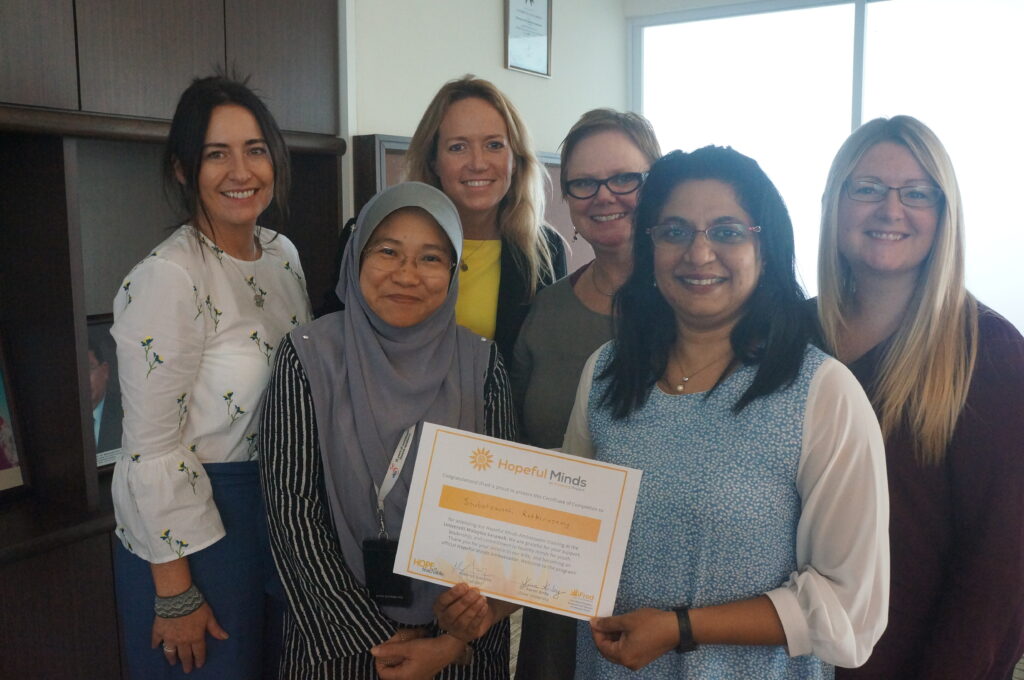Education
We often tell people to have hope, yet hope is not something that has typically been “taught.” The word itself is often misused in the popular media, used more like a “wish” than something we control with action. So how can we expect people to move from hopelessness to hope, unless we teach them how?
This is why we are so passionate about teaching hope, especially to kids. We know if we reach them at an early age (before 10), the skills we teach them are much easier to integrate. And by teaching hope skills at an early age, we are equipping them with the roadmap they need to start reaching their goals.
Our programs meet both National Health Educational Standards (NHES) and Social and Emotional Learning (SEL) Guidelines. You can find all the information about how on the Hopeful Minds website and in the curriculums themselves. The programs are used across cultures, yet we suggest you adapt stories and Hope Heroes to make them more culturally specific.
It has an impact not just on the students, but the educators as well. Our program has been downloaded by more than 1500 educators around the world, with more accessing it every day. We have translated the student workbooks to Spanish, and are doing our best to get the programs translated to other languages as well. We welcome your support in making that happen.
As hope is predictive of not just life outcomes, but school outcomes, we believe every child must be taught the “how to” of hope. Their level of hope impacts their ability to graduate, their engagement in class, their learning, and overall health, which all relate to a city’s ability to function. Hope even predicts their sports performance, so we encourage you to inspire kids to hope using athletes as examples.
Take Action with the following interventions:
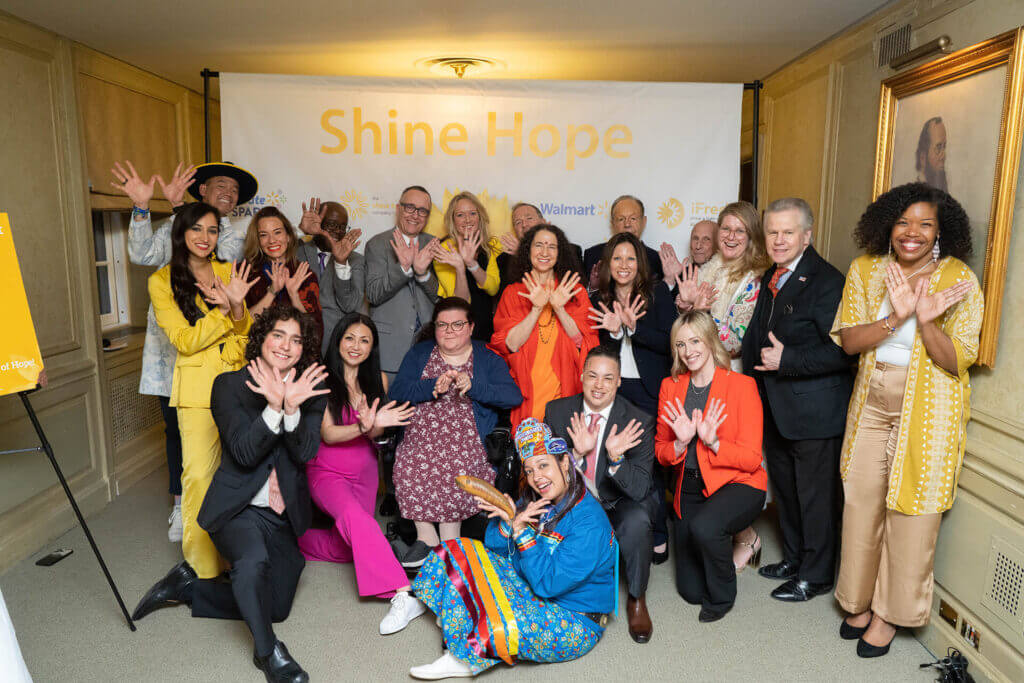
International Day of Hope
The International Day of Hope, scheduled May 1st, provides an opportunity for global solidarity. On this day, we come together to share the science, stories, and strategies of hope and actively engage in implementing hope in our lives and communities worldwide. Our goal is to advocate for the establishment of The International Day of Hope through an official United Nations resolution. This initiative will kick off a five-day campaign featuring the Five Day Global Hope Challenge, yard signs, sunflower gardens, workplace educational posters, sunflower Shine murals, live speaking events, classroom teachings of Hopeful Minds, and more.
We encourage Mayors, Governors, and schools to issue proclamations for their towns and environments, demonstrating solidarity in officially recognizing the day and joining the Hopeful Cities Movement.
Five-Day Hope Challenge & Social Media Campaign
The Five-Day Global Hope Challenge is a five-day e-mail challenge ensuring all know the what, why, and how to hope. It reviews what hopelessness is, the Shine Hope framework, and instructs how to measure hope. It is a simple way to get started learning how to Shine Hope.
Social media is a great way to share the resources available for hope with your friends, family, and community, so we have created a social media toolkit for hope as well. All of our images and content are available to download at no cost to share and activate the message for hope.
Download the Hope Challenge Social Media Kit for daily social media posts:
You can also help your community access the Hopeful Cities resources by tagging us in your posts using @theshinehopecompany @ifredorg #HopefulCities #Hope
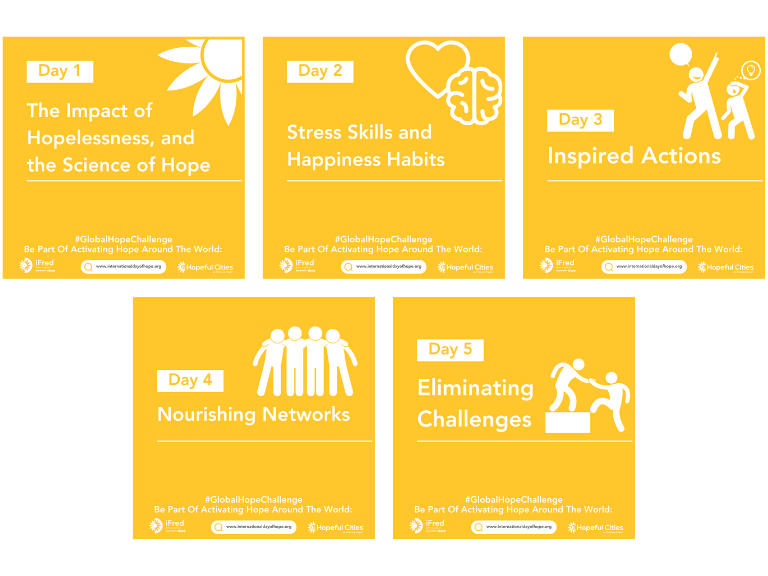
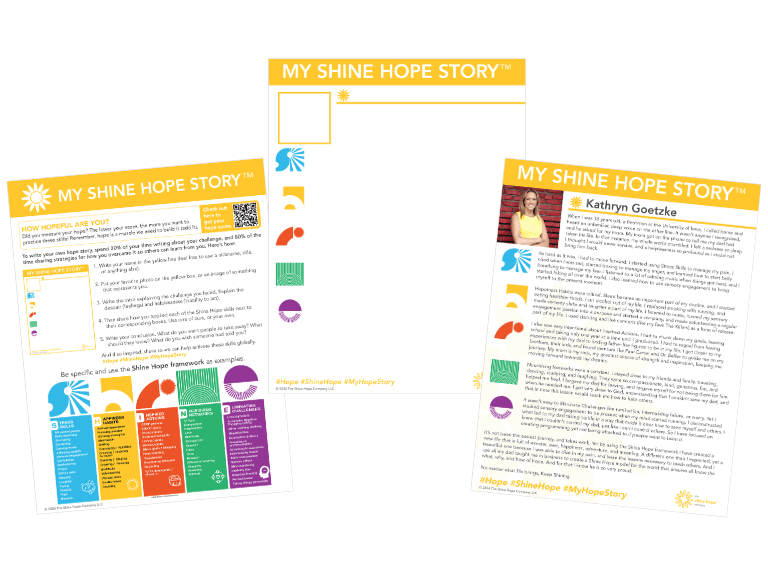
My Shine Hope Story™ Template for Leadership
My Shine Hope Story gives community leaders an avenue to normalize hopelessness and share their unique experiences by using the Shine Hope framework. We all experience moments of hopelessness (i.e., emotional despair and motivational helplessness). How we manage the moments of hopelessness matters.
We suggest you share a recent challenge, large or small. We encourage you to spend 20% of the time describing what the hopelessness was about (sadness, anger, fear, and powerlessness). We then ask you to spend 80% of the story sharing how you overcame it.
What Stress Skills did you use? What Happiness Habits did you practice? What Inspired Actions did you take to make it through? How did your Nourishing Networks support you? And what was one of your biggest challenges (i.e., negative thought pattern), and how did you overcome it?
We created an outline for you to use while creating your Hope Story, and you can use our Shine Hope infographic for some ideas.
We encourage you to share your story with the community while encouraging others to share their stories as well. Discuss what skills work, help all practice, and be sure people know where to go for support if they are having challenges in your city.
If you want to share your hope story on social media, we encourage you to do so. Please tag us @ifredorg @theshinehopecompany #myhopestory #myhopehero so we can share with others.
Digital Communication Assets: Shine Hope Infographic, Moment of Hope Cards, Teen and Adult Brochures, Posters, Signs, and Billboards
Our digital communications provide an opportunity to educate all on the Shine Hope framework in an easy-to-understand way. We have an infographic and digital downloadable tool for newsletters or social media posts to describe the Shine Hope framework at no cost.
We have two brochures that are great for sharing in newsletters or other city-wide communications. Our Digital Shine Hope Brochure is geared toward adults, while our Teen Shine Hope brochure is similar, yet more teen-friendly. Both brochures include tips on the Shine Hope framework, and have resources to help elevate hope in your life and with others.
We also have Shine Hope Posters you can use as individual images, or on web portals, that give more details into the Shine Hope Framework. Lastly, we have a Sunflower Fascinating Facts poster for some interesting tidbits on sunflowers, if you have an interest!
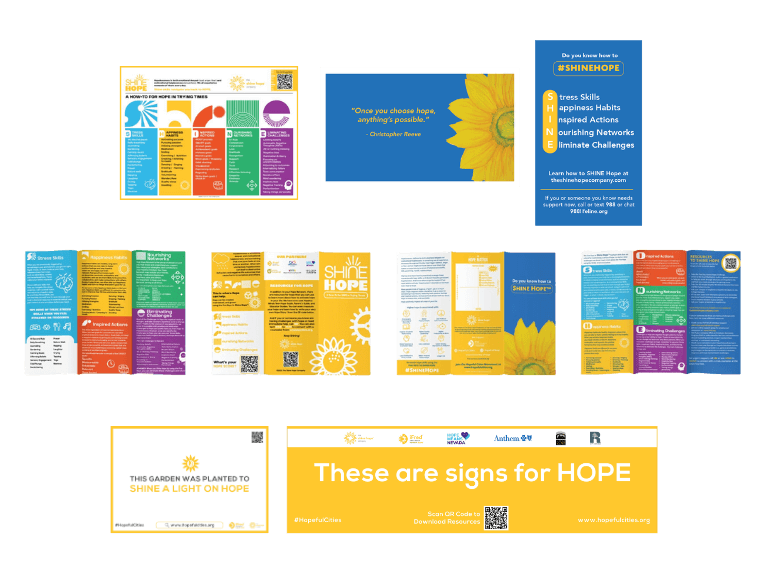
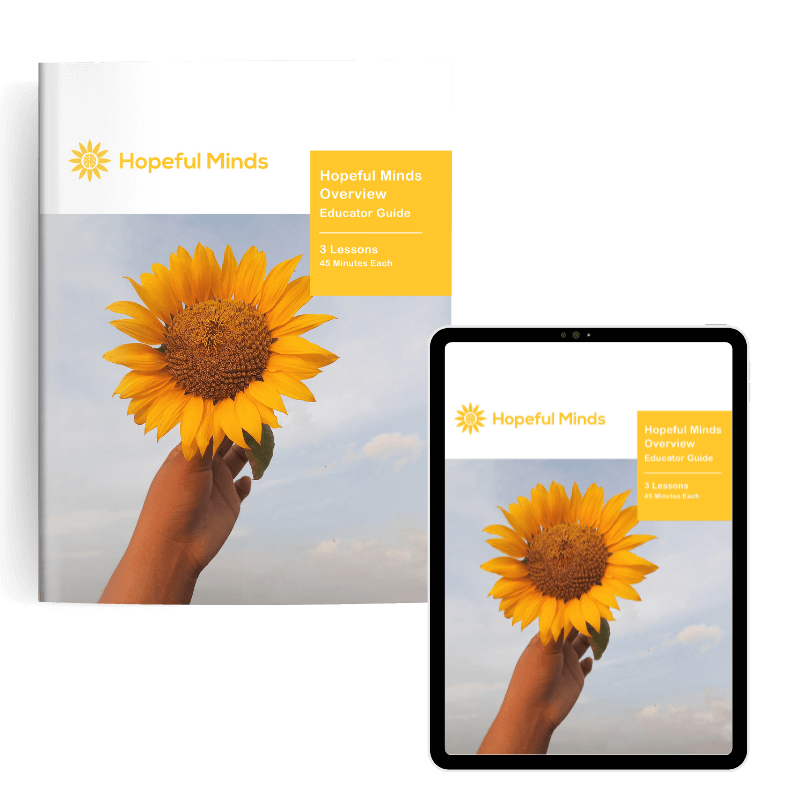
Hopeful Minds Overview K-6 Digital Version and Print Version
The Hopeful Minds Overview is a curriculum designed to give children an introduction to the “what,” “why,” and “how” of hope. The curriculum includes three, one-hour lessons that introduce the key tools needed to create, maintain, and grow hope. Additionally, the curriculum includes background information for educators, supplemental resources, classroom visuals, and a Hopework Book for students.
While this curriculum is geared towards 2nd-grade students, it can be easily adapted for any age range (adults included) and can be utilized in any setting (such as schools, after-school programs, places of worship, hospitals, offices, and more). This curriculum has been specially designed to be used for either classroom or remote learning.
The digital guide is available at no cost. This is the downloadable version of the curriculum, and we have downloadable fillable workbooks as well:
$ We recognize some may prefer hard copies of our programming. Get your copy here:
Hopeful Minds Parent’s Guide Digital Version and Print Version
The Hopeful Minds Parent’s Guide provides a broad overview of the concepts discussed in the Hopeful Minds curriculums, and provides parents with easy ways to implement the Five Keys to Shine Hope (Stress Skills, Happy Habits, Inspired Actions, Nourishing Networks, and Eliminating Challenges) and hopeful language in the home. It is helpful when parents reinforce hope language at home, so the family can practice together.
Hope is measurable and teachable. With hopelessness at an all-time high in youth, we’ve got to be proactive about practicing these skills with youth. This is a tool parents can use to talk about mental health in a positive, proactive way at home and know what to look out for and find resources for support.
The digital guide is available at no cost:
$ We recognize some may prefer hard copies of our programming. Get your copy here:
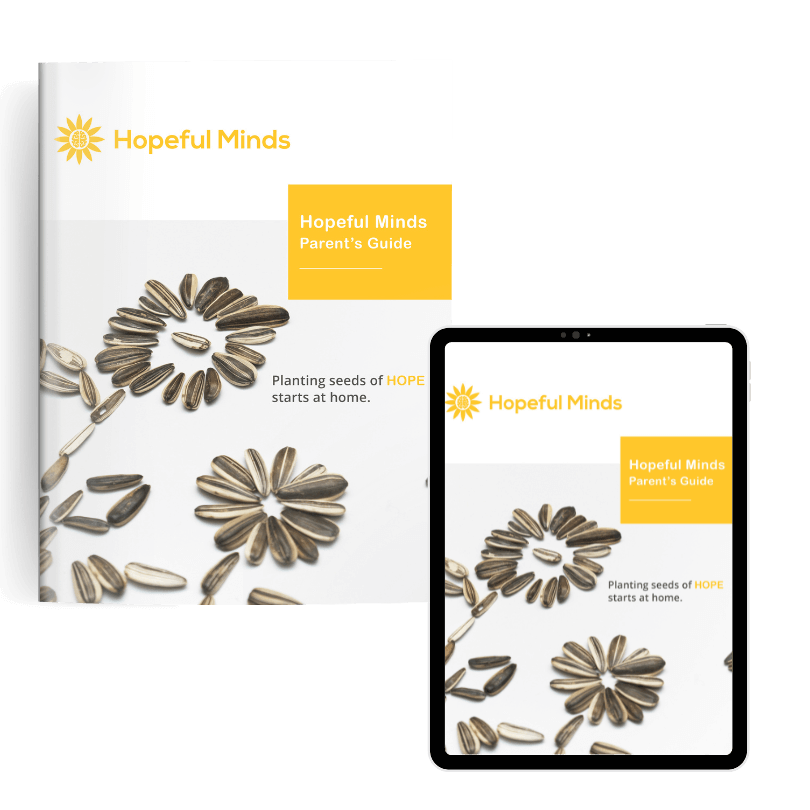

Hopeful Minds Deep Dive K-6 Digital Version and Print Version
The Hopeful Minds Deep Dive Educator Guide is a curriculum for K-6 (but can be used for any age) designed to give children a deeper understanding of the core components of hope. The curriculum is scripted allowing anyone to teach the 16, 45-minute lessons that explore the tools needed to create, maintain, and grow hope, background information for educators, supplemental resources, classroom visuals, and a Hopework Book for students. It meets National Health Education Standards put forth by the CDC. The Hopework Book is included in the curriculum, but it can also be downloaded separately.
$ We recognize some may prefer hard copies of our programming. Get your copy here:
Hopeful Minds Teen Hopeguide Digital Version and Print Version
Our Hopeful Minds Teen Hopeful is a 12-module workbook that was tested and approved by teens. The program introduces the Five Keys to SHINE Hope™: Stress Skills, Happiness Habits, Inspired Actions, Nourishing Networks, and Eliminating Challenges. This comprehensive approach empowers teens to navigate challenges, embrace positivity, and empower resilience.
The workbook employs a peer-to-peer teaching style, encouraging both individual reflection and group discussions. Interactive elements such as engaging activities, games, creative expressions, worksheets, and puzzles enhance the learning experience. The workbook itself is the curriculum, so educators are not necessary for use. We encourage having facilitators, yet it is designed for anyone to use.
It is based on the award-winning Hopeful Minds program and is intended for teens to do together. As in the US alone, 57% of teen girls are identifying with persistent hopelessness, we encourage entire schools and classrooms to do the program. It is a proactive, protective approach to mental health. These are skills all youth need to learn and can be implemented in classrooms, after-school programs, places of worship, and more. Anywhere that teens gather, this program is encouraged for use.
$ We recognize some may prefer hard copies of our programming. Get your copy here:
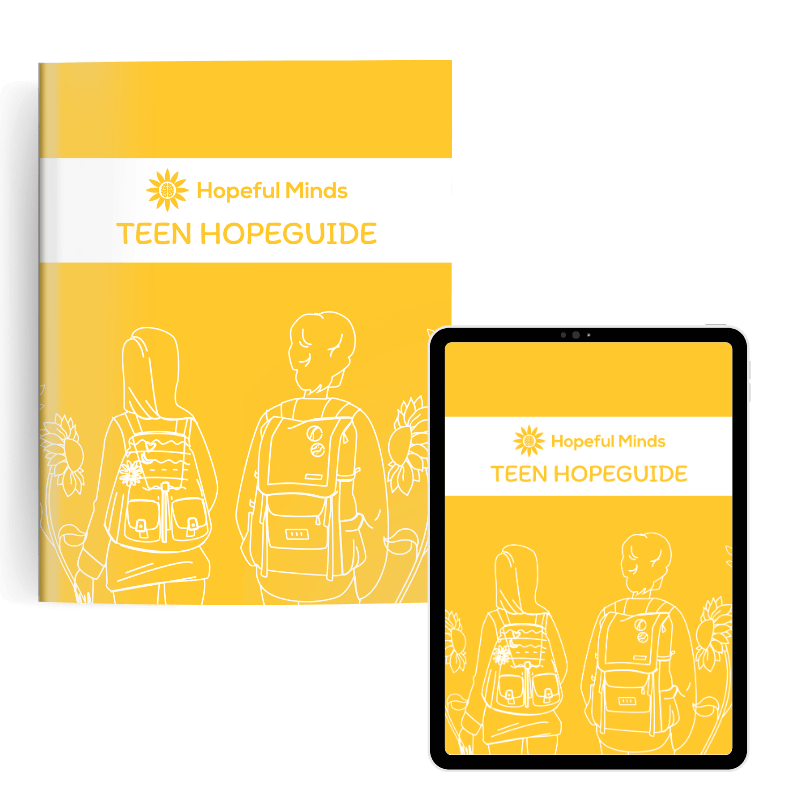
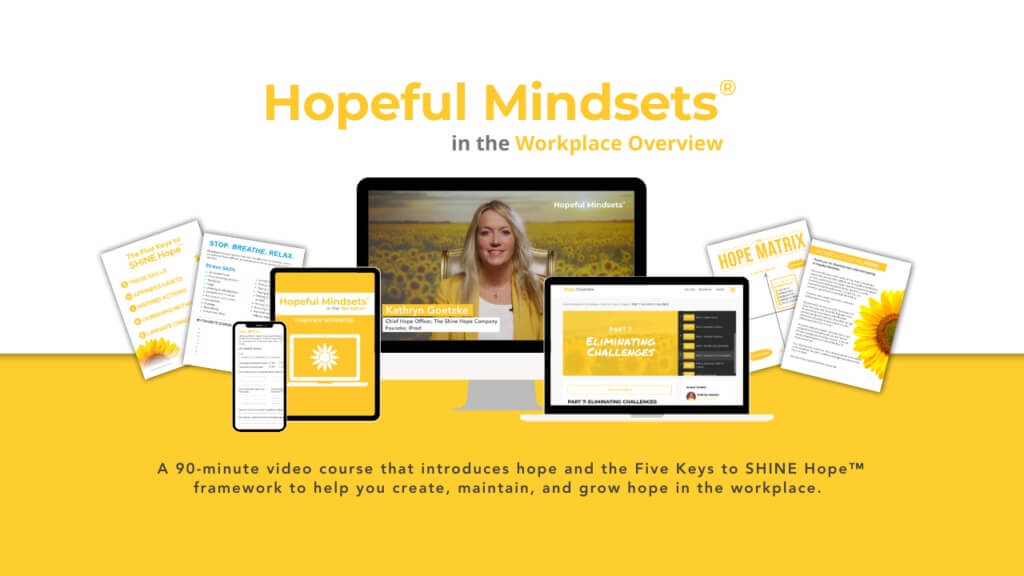
Hopeful Mindsets Overview Workplace Video Course License
The Hopeful Mindsets Overview Workplace Video Course offers a comprehensive understanding of hope and its practical application in the workplace. The annual license grants access to the 90-minute video course for up to 250 employees, providing them with the tools and knowledge to cultivate hopeful mindsets and promote a positive work environment. We will also provide access to Shine Hope Posters that can be used to reinforce the Shine framework throughout the workplace.
For bulk license, e-mail us at activate@theshinehopecompany.com.
Hopeful Mindsets on the College Campus 10-Module Video Course
Hopeful Mindsets on the College Campus is a 10-module video course from The Shine Hope Company that equips students with crucial hope skills through expert insights and real-life stories. The course features experts from Harvard, Stanford, and Columbia, with insights from recent college graduates that offer real-life practical strategies and stories from their experiences with homelessness, mental health diagnoses, death, violence, and everyday challenges at school.
For bulk license, e-mail us at activate@theshinehopecompany.com.
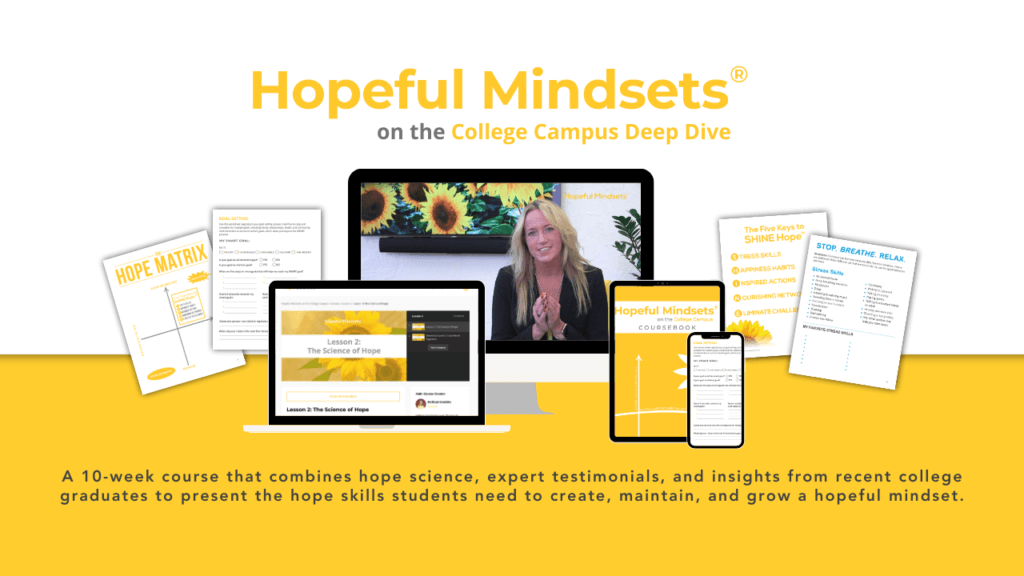
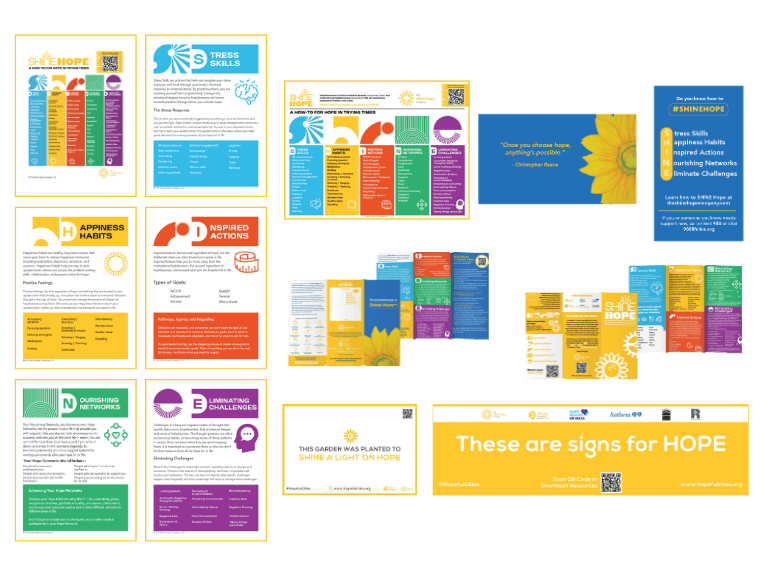
Printed Shine Hope Educational Materials for Staff and Waiting Rooms: Moments of Hope Cards, Teen and Adult Brochures, Posters, Signs, and Billboards
Our print communications provide an opportunity to educate all on the Shine Hope framework in an easy-to-understand way. We want to ensure all are equipped with a crisis hotline and skills to proactively activate their hope. It is our goal to ensure all know that hope is a skill, measurable, and teachable.
We have two brochures, a general one and a teen-focused one, available for waiting rooms, community centers, lobbies, offices, or libraries. We have posters for the walls in workplaces, coffee shops, libraries, or waiting rooms, and Moments of Hope cards to hand out anywhere people gather. Lastly, we have a Sunflower Fascinating Facts poster for some interesting tidbits on sunflowers, if you have an interest! All of these print materials serve as a cost-effective approach to getting the word out about hope, and start equipping the population to take a proactive approach to managing hope in their life and the lives of others.
Hope Ambassador Program & Hope Clubs Framework
We are working to build out models for Hope Ambassadors and Hope Clubs. In Reno, the city has an Ambassador program where they distribute our Moments of Hope cards, to ensure all know where to go for support. We encourage you to set up an ambassador program in your city.
Be sure to sign-up for our newsletter to hear when we have a Hope Ambassador and Hope Club framework set-up.
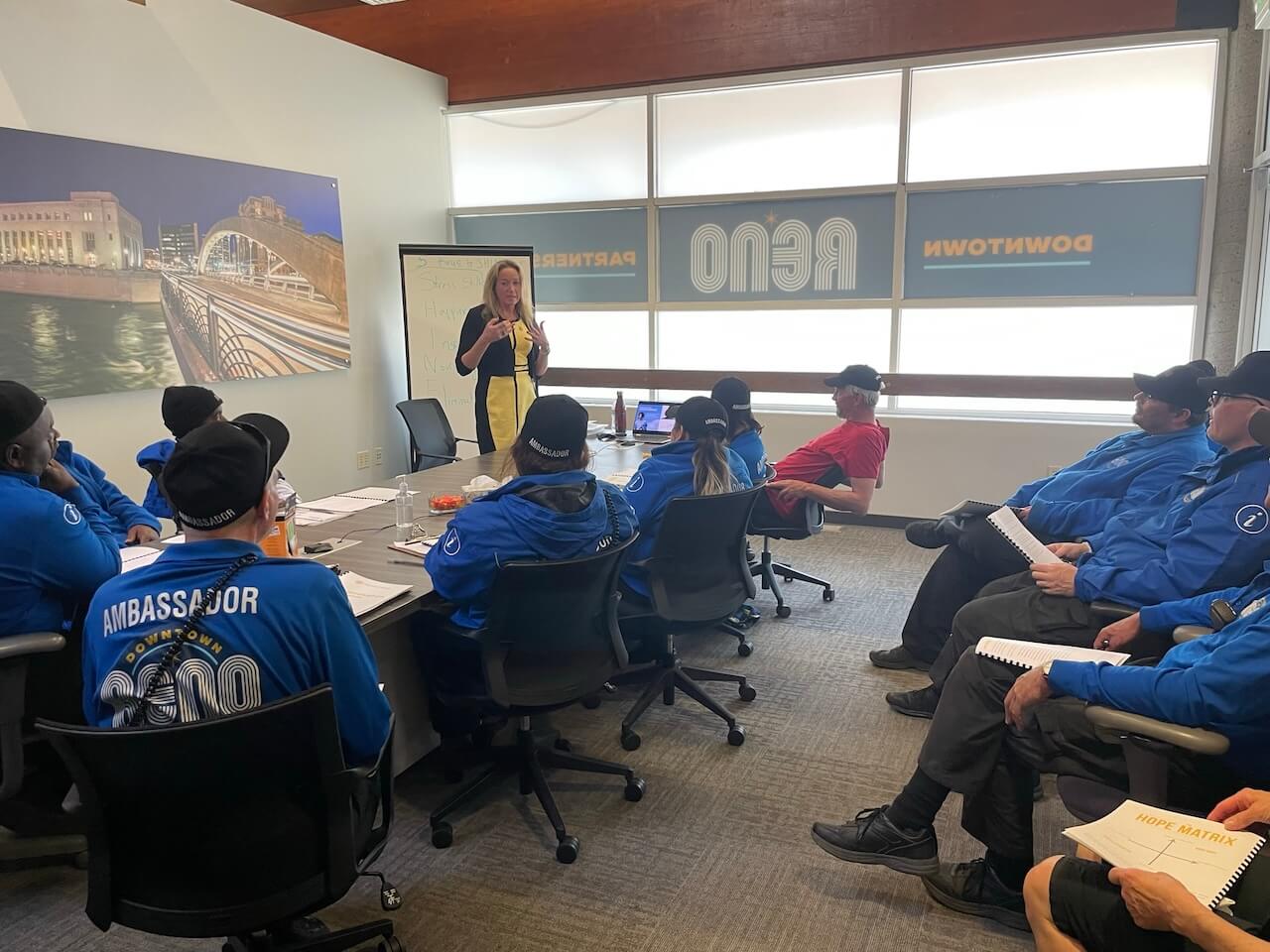
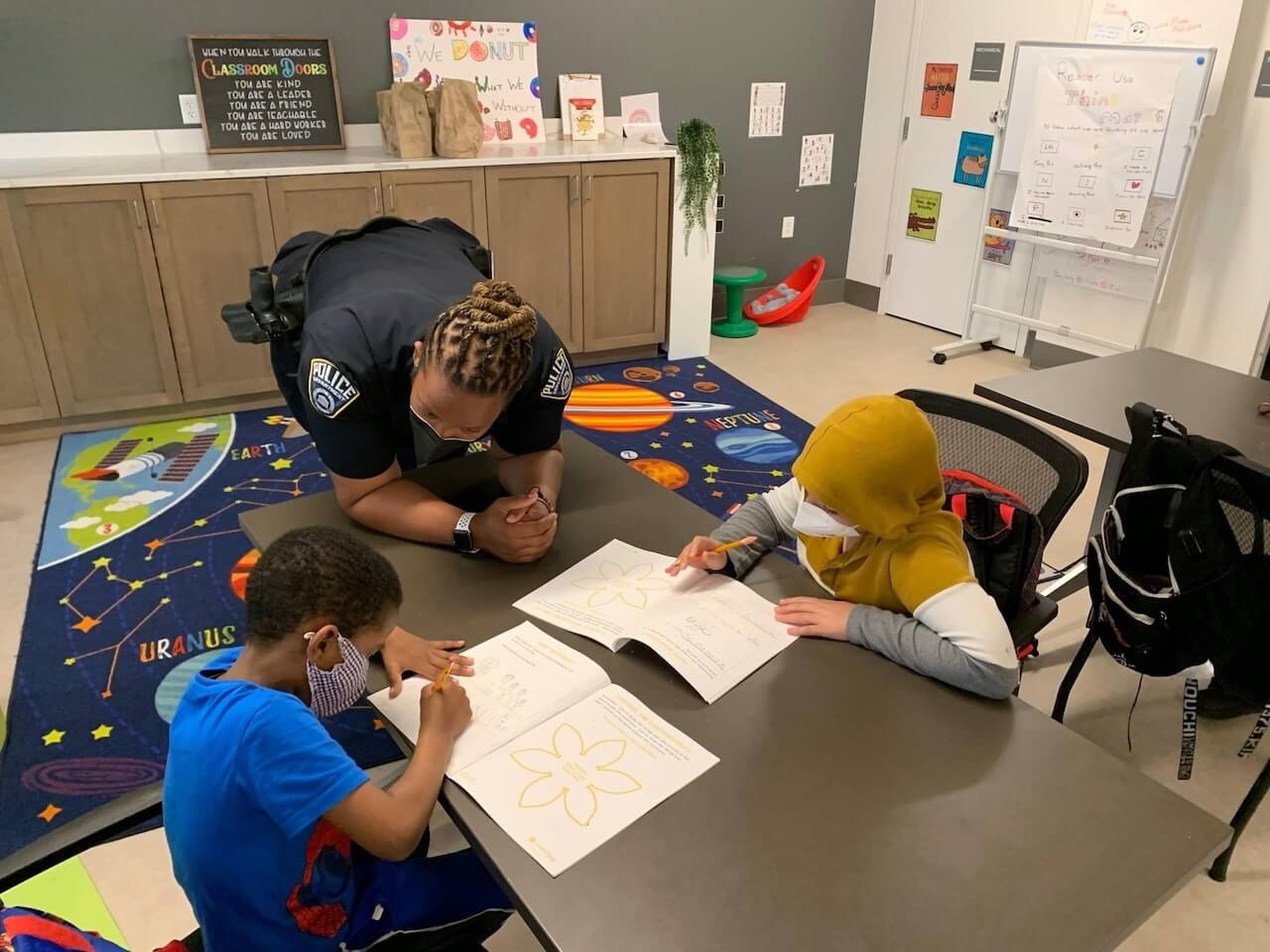
Community Members Teaching Hope Video Training (police, older population, etc.)
We have expanded our reach by involving police officers in teaching our Hopeful Minds program. Additionally, we offer a video course that provides guidance on implementing similar strategies. With our programs being scripted, anyone proficient in English can effectively teach Hopeful Minds in various settings, including schools, after-school programs, housing authorities, and other community initiatives.
Given that the first key to Shine Hope is identifying and managing the stress response, we believe that engaging police officers in positive and productive interactions with children will enhance community relations. This approach introduces children to the transformative power of hope while equipping first responders with crucial hope skills to combat feelings of hopelessness. We firmly believe that teaching is the best way to learn.
Educator Training
We offer both online and in-person training sessions for educators on the Hopeful Minds program. Our training comprehensively covers the science of hope and hopelessness, delves into the Five Keys to Shine Hope, provides insights into available resources for educators, and equips them with effective strategies for engaging youth in the classroom.
Find out more about the training at activate@theshinehopecompany.com.
